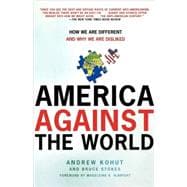
Note: Supplemental materials are not guaranteed with Rental or Used book purchases.
Purchase Benefits
Looking to rent a book? Rent America Against the World How We Are Different and Why We Are Disliked [ISBN: 9780805083057] for the semester, quarter, and short term or search our site for other textbooks by Kohut, Andrew; Stokes, Bruce. Renting a textbook can save you up to 90% from the cost of buying.
| Foreword | p. ix |
| Introduction: America's Image | p. xiii |
| America Under the Microscope | p. 1 |
| The Rise of Anti-Americanism | p. 22 |
| The American Way | p. 41 |
| The Problem of American Exceptionalism | p. 68 |
| A Blessed People | p. 91 |
| Doing Business, Practicing Democracy | p. 120 |
| Globalization and Americanization | p. 138 |
| Acting Together-Or Alone | p. 162 |
| Use of Force | p. 193 |
| Two Americas, One American | p. 206 |
| Conclusion: What We Are, What We Are Not | p. 220 |
| Pew Global Attitudes Polling | p. 227 |
| Notes | p. 229 |
| Acknowledgments | p. 243 |
| Index | p. 247 |
| Table of Contents provided by Ingram. All Rights Reserved. |
The New copy of this book will include any supplemental materials advertised. Please check the title of the book to determine if it should include any access cards, study guides, lab manuals, CDs, etc.
The Used, Rental and eBook copies of this book are not guaranteed to include any supplemental materials. Typically, only the book itself is included. This is true even if the title states it includes any access cards, study guides, lab manuals, CDs, etc.
Excerpted from America Against the World: How We Are Different and Why We Are Disliked by Andrew Kohut, Bruce Stokes
All rights reserved by the original copyright owners. Excerpts are provided for display purposes only and may not be reproduced, reprinted or distributed without the written permission of the publisher.